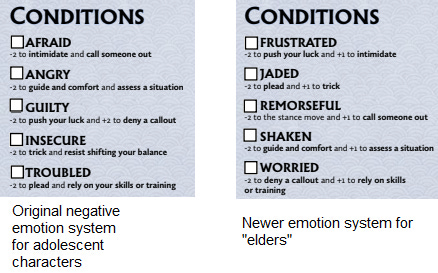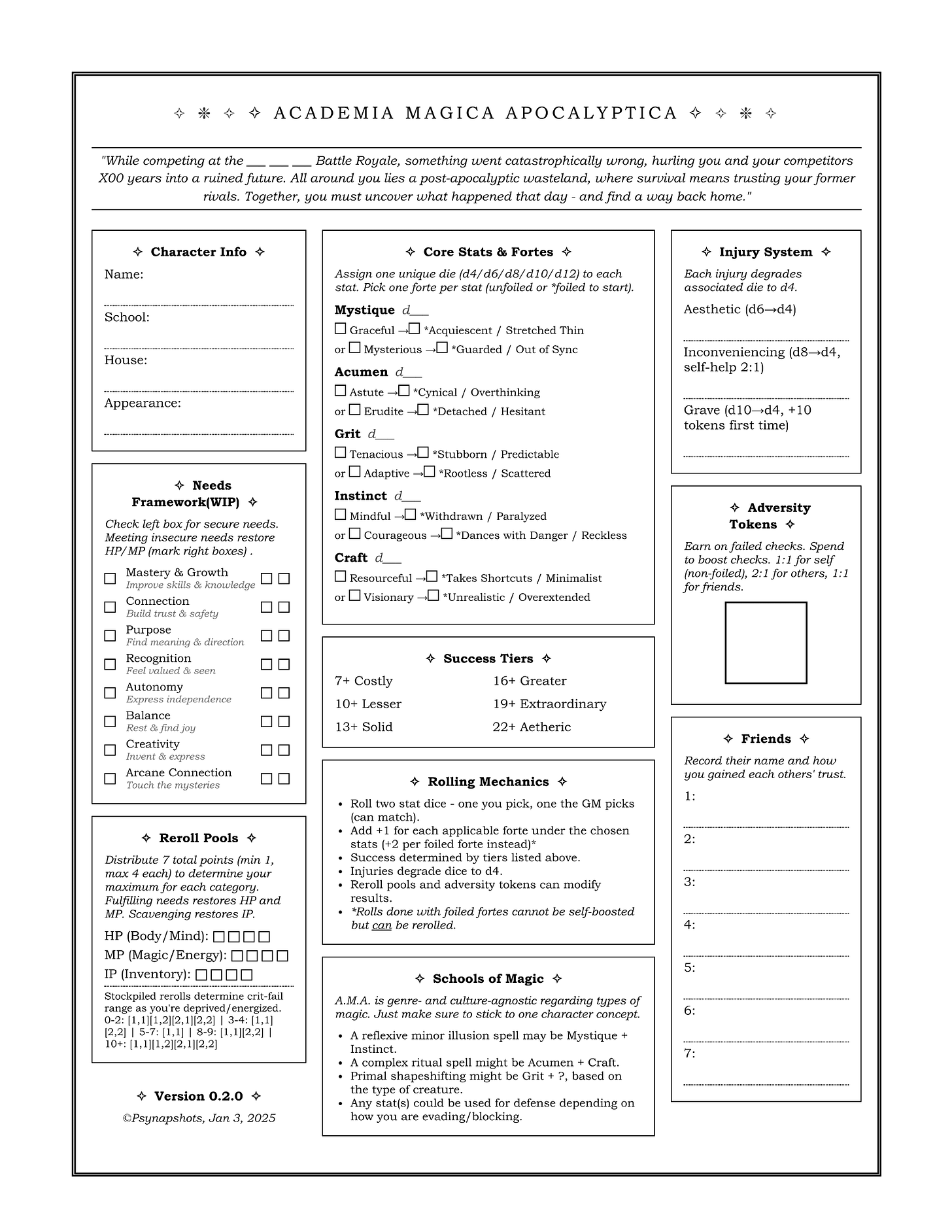Update on gamifying CBT or CBT-ifying games
Have there been interesting developments in gamifying CBT?
Yes, but for CBT-ifying gaming. These days, I mainly work running tabletop roleplaying games. At least one new game has started incorporating CBT-esque principles. The Avatar: The Last Airbender game (Conway, 2022) has tried un-dichotomizing emotional conditions by introducing negatively valanced emotions with upsides (Fig 1; strong parallels here to Inside Out (2015)). Although there have been dozens of 40-ish participant studies on Dungeons & Dragons (Yuliawati et al., 2024), other game systems that are more adaptable and accessible (teachable in <5 minutes) have started to be explored (Varrette et al., 2023; Kids on Bikes). Research has also branched out into occupational therapy (Hazlett et al., 2024).
Why has the converse – gamifying interventions or “serious games” – seemingly not worked very well (Dewhirst et al., 2022)? The games’ overly directive and ‘unaesthetic’ framing might be the cause; the perceivable intentionality of serious games as primarily a therapy and secondarily a game may compromise its effectiveness as compared to the emphasis on entertainment and enjoyment in regular gaming (See Barbieri et al., 2023, for how aesthetic appreciation of music lowers anxiety and increases curiosity during gambling tasks). Sarasso et al. (2022; 2024) theorize that beauty or aesthetics can help clients tolerate more uncertainty and shift to new regimes of behaviour. Fortunately, the RPG space seems to be moving away from the cis-male aesthetics of D&D, with double the number of successful non-D&D RPGs on crowdfunding sites in 2024 vs 2023 (Tabletop Analytics, 2024, as cited by Indestructoboy, 2024).
Figure 1
Figure 2. Prototype One-Page TTRPG
References
Barbieri, P., Sarasso, P., Lodico, F., Aliverti, A., Murayama, K., Sacco, K., & Ronga, I. (2023). The aesthetic valve: How aesthetic appreciation may switch emotional states from anxiety to curiosity. Philosophical Transactions of the Royal Society B: Biological Sciences, 379(1895), 20220413. https://doi.org/10.1098/rstb.2022.0413
Dewhirst, A., Laugharne, R., & Shankar, R. (2022). Therapeutic use of serious games in mental health: Scoping review. BJPsych Open, 8(2), e37. https://doi.org/10.1192/bjo.2022.4
Hazlett, N., Smith, L., Murray, E., & Duncan, A. (2024). Exploring tabletop role-playing games as meaningful occupations: A qualitative exploratory study. Occupational Therapy In Health Care, 1–18. https://doi.org/10.1080/07380577.2024.2403784\
Indestructoboy. (2024, Dec 30). My 2025 predictions for the TTRPG industry [Video]. Youtube. https://www.youtube.com/watch?v=pojJozVuLQY
Sarasso, P., Francesetti, G., Roubal, J., Gecele, M., Ronga, I., Neppi-Modona, M., & Sacco, K. (2022). Beauty and uncertainty as transformative factors: A Free Energy Principle account of aesthetic diagnosis and intervention in Gestalt psychotherapy. Frontiers in Human Neuroscience, 16, 906188. https://doi.org/10.3389/fnhum.2022.906188
Sarasso, P., Tschacher, W., Schoeller, F., Francesetti, G., Roubal, J., Gecele, M., Sacco, K., & Ronga, I. (2024). Nature heals: An informational entropy account of self-organization and change in field psychotherapy. Physics of Life Reviews, 51, 64–84. https://doi.org/10.1016/j.plrev.2024.09.005
Tabletop Analytics. (2024). https://www.tabletopanalytics.com/
Varrette, M., Berkenstock, J., Greenwood-Ericksen, A., Ortega, A., Michaels, F., Pietrobon, V., & Schodorf, M. (2023). Exploring the efficacy of cognitive behavioral therapy and role-playing games as an intervention for adults with social anxiety. Social Work With Groups, 46(2), 140–156. https://doi.org/10.1080/01609513.2022.2146029
Yuliawati, L., Wardhani, P. A. P., & Ng, J. H. (2024). A scoping review of tabletop role-playing game (TTRPG) as psychological intervention: Potential benefits and future directions. Psychology Research and Behavior Management, 17, 2885–2903. https://doi.org/10.2147/PRBM.S466664


